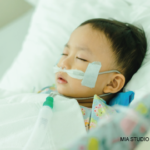CHICAGO (Reuters)—Three U.S. children infected with the coronavirus are being treated for a rare inflammatory syndrome that appears similar to one that has raised concerns by doctors in Britain, Italy and Spain, a specialist treating the patients told Reuters.
All three—who range in age from 6 months to 8 years—have undergone treatment at Columbia University Medical Center, New York, and all had fever and inflammation of the heart and the gut, suggestive of Kawasaki disease.
“Right now, we’re at the very beginning of trying to understand what that represents,” Columbia’s Mark Gorelik, MD, tells Reuters.
Dr. Gorelik, a pediatric rheumatologist and immunologist, says he was called in to consult on the cases to evaluate whether the children have Kawasaki disease, an illness thought to be linked to infection that in severe cases causes inflammation of the arteries of the heart.
Italian and British medical experts are investigating a possible link between the coronavirus pandemic and clusters of severe inflammatory disease among infants arriving in hospitals with high fevers and swollen arteries.
The syndrome has been largely undetected in the United States, according to the American Academy of Pediatrics.
Dr. Gorelik says he believes the cases are likely not Kawasaki disease, but a similar process that shares an underlying mechanism with Kawasaki, which is thought to be triggered by an infectious agent that sparks an immune response.
“This has very similar features,” he says.
The three New York cases follow a report at Stanford University, California, in which a 6-month-old was admitted to the hospital with Kawasaki disease and was later diagnosed with COVID-19.
“When the baby came back positive, it was a bit of a surprise,” says Roshni Mathew, MD, a pediatric infectious disease specialist at Stanford’s Lucile Packard Children’s Hospital.
Dr. Mathew, who wrote up the case in the journal Hospital Pediatrics, says the cause of Kawasaki disease is not known, but several pathogens have been suggested as a possible trigger, including some human coronaviruses.1
Until now, children have largely escaped some of the more serious complications of COVID-19, which has taken its greatest toll on older adults and those with chronic conditions.
Dr. Gorelik says it’s possible that in some children, the disease has two phases—the initial infection and a secondary immune response that kicks in some weeks later.
“It seems a week to two weeks later, you may have the immune system responding in a very disorganized way,” he says.


